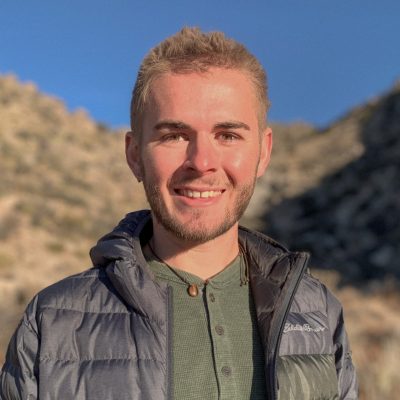Student Spotlight: Trevor Amestoy

December 6, 2021
Trevor Amestoy is a doctoral student in civil and environmental engineering with a focus on environmental and water resource systems from Albuquerque, New Mexico. After attending the University of New Mexico as an undergraduate, he chose to pursue further study at Cornell due to his research group.
What is your area of research and why is it important?
My research focuses on decision making under uncertainty, specifically regarding environmental and water resource systems. We have created a world that relies upon the complex systems at the intersection of the built and natural environments. However, these systems must accommodate a high level of uncertainty. Uncertainty can arise due to changes in the climate, unforeseen consequences of economic or government policies, or simply our inability to measure or monitor different interactions. Our research group focuses on developing frameworks for operating under these uncertainties, attempting to generate management paths that will be resilient across the full range of possible future scenarios.
What are the larger implications of this research?
Currently, a significant amount of time and effort is being devoted toward understanding how the climate is changing. This is very difficult, and researchers still struggle to accurately model environmental dynamics (think about how often the weather forecast is wrong). Despite this lack of understanding, decisions must be made now about what type of infrastructure and policies should be put in place. These decisions will have lasting impacts for future generations. We are trying to develop the tools that can allow those decisions to be made while ensuring a sustainable world for future generations.
What does it mean to you to have been awarded a NSF Graduate Research Fellowship?
Receiving the NSF GRF was incredibly rewarding; it confirmed that all my effort over the past several years was worthwhile, that I had potential to succeed as a researcher, and that my research of interest was valuable. I am a first-generation university student and had invested a huge amount of time and effort into the application process. The award made me feel very proud of myself, but also made me very thankful for the people who supported me along the way.
What will your fellowship allow you to do that you may not have been able to otherwise?
The GRF provides me with the freedom to investigate topics that I find important, without the stress of securing project-specific funding.
What are your hobbies or interests outside of your research or scholarship?
In my free time, I prioritize fun physical activities: trail running, hacky-sacking, and rock climbing, to name a few. I’ve also started reading a lot of sci-fi recently.
Why did you choose Cornell to pursue your degree?
I chose to come to Cornell specifically to join Professor Reed’s research group. I recognized that his research is increasingly important as modern water resource systems become more stressed and complex. Professor Reed had shown support for me and my ideas early in the GRF application process, and I appreciated his interest in me as a researcher. As I met more of his students, I noticed that they shared similar values with me and that this was a group I wanted to be a part of.
